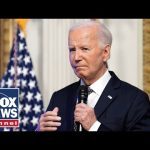**The Fall of an Iron Fist: A Light Shines on Syria’s Future**
n a recent discussion on the significant developments in the Middle East, optimism filled the air regarding the end of Bashar al-Assad’s dictatorship in Syria. Congressman Joe Wilson from South Carolina, a prominent Republican and Chair of the House Foreign Affairs Subcommittee on the Middle East, North Africa, and Central Asia, highlighted the historical significance of this political shift, drawing parallels to the fall of the Berlin Wall. Just as that monumental event opened doors to freedom for many nations, Wilson believes that the demise of Assad could set off a domino effect that ignites hope among the Syrian people and beyond.
However, as any good story goes, there’s a twist in this tale. While Assad’s regime has collapsed, it seems the new characters stepping onto the stage aren’t exactly the Boy Scouts one would hope for. Wilson acknowledged that the landscape in Syria could be filled with less-than-ideal factions vying for power, suggesting that while the removal of Assad marks a victory, it’s essential to keep a watchful eye on who steps into that power vacuum. The risk of extremist groups rising isn’t small, and the potential turbulence raises questions about the future of stability in the region.
Interestingly, Wilson’s comments touched upon America’s role—or lack thereof—in this unfolding drama. President Biden has expressed a desire for the United States to adopt a hands-off approach. While some might see this as a retreat, others might view it as a prudent way to prevent further entanglement in a complex conflict. Nevertheless, it is evident that the U.S. has vested interests in strengthening ties with nations like Turkey, a valuable NATO ally, in hopes of fostering a more stable Syria. The Congressman noted that constructive dialogues are ongoing, signaling a potential for diplomatic avenues that could lead to a more peaceful outcome.
The remarkable impact of international players like Israel also came to light during this conversation. Senator Markwayne Mullin from Oklahoma mentioned Israel’s crucial role in dismantling Hezbollah’s influence in the region, effectively paving the way for the uprising against Assad. Mullin suggested that while the U.S. may not want to be directly involved, a thank-you note might be in order for Israel’s strategic moves, which have altered the power dynamics significantly. It underscores just how interconnected global events are—what happens in one corner of the world can affect another far away.
Yet amidst this shifting political theater, caution remains critical. Congressman Wilson raised alarms over recent incidents involving drones in U.S. airspace. He likened the seriousness of these events to the earlier Chinese balloon episodes that had many scratching their heads and checking their own backyards. With some drones reportedly the size of small cars and capable of being launching pads for missiles, the call for vigilance is clear. This is just another reminder that threats can come from unexpected places, and the need for robust national security measures continues to be paramount.
As the dust settles on Assad’s regime, the unfolding narrative in Syria offers a blend of hope and uncertainty. While the fall of a dictator is undoubtedly a cause for celebration, the march toward democracy remains fraught with challenges. The United States and its allies must navigate this complex landscape with a balance of caution and cooperation to encourage a peaceful and democratic future for the people of Syria. It’s a tall order, but as history has shown, sometimes a little bit of light shines on even the darkest corners of the world.




